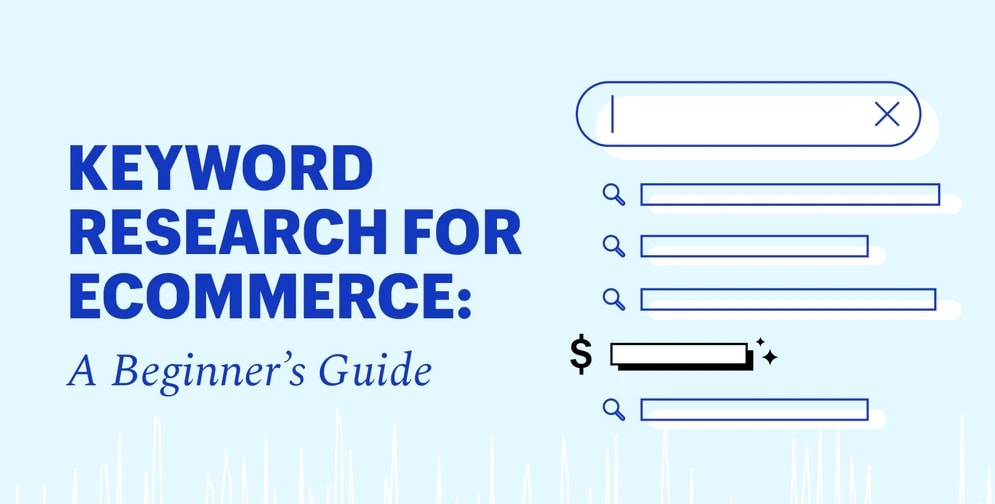Keyword research is an important element in every e-commerce SEO strategy, putting priorities into view for optimization and revealing valuable scaling insights for your online business. It gives a full view of the search landscape and illuminates what customers use precisely to find your website online. This helps in unlocking new growth opportunities.
Understand what kinds of keywords Google prefers will get you closer to the top of search engine results pages, which improves inherently your web visibility, drives more visitors to your business website, and increases conversion rates.
In this post, we are going to look at how you can conduct keyword research specifically for an e-commerce business.

Keyword Research for E-commerce Websites
Before getting deep into e-commerce keyword research, one should know there is an art in choosing those perfect words. A few key points to remember are listed below.
-
Search Volume
This is what is called average monthly searches and is the total number of searches done each month for a given keyword phrase. The idea is to target keywords that boast a high monthly search volume since that would mean user interest in that particular term is immense.
However, high volume normally means higher ranking competition.
You can also read: How to Find Buyer Intent Keywords
That said, targeting more competitive keywords is possible with great content creation and acquiring backlinks; however, the path to success may be far longer with more hurdles along the way.
Finally, it should be outlined that there is no magic number of searches because this attribute highly depends on the characteristics of your website. A general guideline for keyword selection includes supposition to take into consideration any term over 20 searches a month, so long as it has the potential to drive qualified leads.
There are a few free keyword research tools to find the search volume, but highly recommended by CamRojud is the paid tool Ahrefs.
-
Search Relevance
Search relevance refers to how closely related the query is to the returned results.
Even if you can find a keyword that has high volume searches, if the search results that do pop up are unrelated to the content on your page or to the products you sell, your chances of long-term goals or conversions are slim.
More importantly, to put it into perspective, 10 qualified leads brought in through an organic search are much better than driving 1,000 visitors who immediately bounce off because they can’t find what they look for on your page.
-
Keyword Difficulty
Keyword difficulty, also called SEO difficulty or keyword competition, is a quantified rating from 0 to 100. The score is supposed to describe the difficulty level a user is likely to face when trying to rank high in Google for a particular keyword.
The greater the keyword difficulty score, the more arduous a journey it is to compete with existing search results. In short, it all comes down to the quality of your website, its authority, and content you build up around every keyword targeted.
Ahrefs provides a useful way to measure where you stand by deciphering the authority signals through what they call “domain rating,” based on your current backlink profile. When you have a new website, usually you should go for keywords that have less difficulty score.
How To Conduct Keyword Research For E-commerce
Determine Your Ranking Position for Relevant Searches
Before you can make smart decisions about your strategy concerning your keywords, you need to establish some benchmarks. This will give you a roadmap on which to base your decisions about creating new content versus refining existing content.
You can also read: An Ultimate Guide to Understanding User Intent in SEO
If you have already begun making your e-commerce site and have included SEO keywords, you will want to know where your website stands for those keywords with the use of a keyword ranking tracker. Again, Ahrefs has this functionality with its Rank Tracker feature, in addition to those listed above.
You can also unlock some very useful data without having to pay by connecting your site to Google Search Console or GSC.
- Google Search Console: It monitors the overall health and performance of your website regarding Google search. This tool will monitor what keywords your website are currently ranking for, through which you will be able to judge your standing and which all keywords you should optimize or target. Use this priceless information to enhance your content.
Consider Search Intent
Today, it is one of the biggest pieces of information in trying to catch your target customer for a visit to your website.
In days gone by, keyword placement and the number of backlinks going to your website were prized above everything else by the Google algorithm. This is why much of the keyword research advice advocated the use of long-tail keywords. However, with low-quality backlinks and keyword-stuffed content proliferating, Google’s algorithm has been evolving to make way for semantics, intent, and relevance. Keyword research strategies had to change in response to this.
Yet, some SEO experts still overlook search intent, which is actually one of the biggest SEO mistakes any person can make. If you don’t pay attention to search intent, you could end up ranking for keywords that aren’t relevant, or attracting an audience not targeted toward your objectives. Both of these options equate to lost opportunity and resource wastage.
You can get keyword intent from clues such as specific identifier words or types of e-commerce pages they relate to. For example, informational keywords will relate to blog or FAQ pages, while commercial keywords tend to relate to product pages. Alternatively, you could use a keyword intent tool like Semrush and speed up the process by automating how you categorize intent.
You can also read: The Importance of Keywords in Paid Search
Other ways, in the world of e-commerce, to judge keyword intent is through using the cost-per-click metric in your favorite keyword research tool.
Informational Intent
Searchers who seek an answer are performing informational searches. These are not typically converting searches immediately but are potential customers who are in the early stages of their buying cycle, or what some refer to as the top of the sales funnel. These sorts of keywords will more than likely appear within:
Keywords related to informational intent, according to Google’s Search Quality Rater guidelines, fall into “I want to know” search intent. They often answer questions like:
- How.
- How to.
- What to.
- Where to.
Optimizing your content for informational intent also lets you enjoy the added benefit of placing your content for position zero, or the featured snippet, in regard to your target keyword.
Featured snippets will appear at the top of a SERP even if, under normal circumstances, your site wouldn’t necessarily outrank other competitive domains for that type of content.
Informational intent keywords are worth a lot in establishing yourselves as an authority, which means quite a bit when it comes to selling products such as online courses and e-books.
Commercial Intent
Commercial searches lie in the middle of informational and transactional queries, which are used by searchers who find themselves midway through the sales funnel. Potential customers now know your product but may not be quite convinced about the product. They do more research for comparing product features and prices and also look out for offers, free trials, or promo details.
Some keyword identifiers that could belong to this intent class are the following keywords:
- Compare.
- For men.
- For women.
- Alternative.
- Review.
- Best.
The point here is to actually optimize for those keywords by creating content that convinces your potential customers that, in some way or another, you outshine the competition. You’ll want to use these keywords in listicles, comparison pieces, and product reviews.
Navigation Intent
Navigation searches are driven by people who are looking for a certain brand, website, company, or geographic location. A good example of this is when users want to go onto a website, they just do a quick Google search opposed to typing in the URL.
E-commerce heavily uses keywords of navigational intent. Inclusion within the SERPs about your brand for marketing purposes may be important, but one should pay close attention to search trends which could create a poor user experience.
Transactional Intent
Transactions or high commercial intent keywords indicate a reasonable level where the intent of the searcher is to take a concrete action. The action could be to make an inquiry, complete a sale, or simply retrieve information that may perhaps lead to a sale at some point.
You can also read: How to Improve the ROI of Your SEO Strategy
Examples of transactional intent keywords include terms like:
- Sale
- For sale
- Buy
- Where to buy
- Discount
- Coupon
- Price
It can also come up in a variety of forms: product keywords such as “winter clothing” and “coffee maker”; branded keywords like “HubSpot,” “Ahrefs,” and “Semrush”; specific product names like “iPhone 13,” “Samsung S22,” and “Macbook Air M2.”. All these indicate some kind of intention for imminent action.
These transactional keywords work best on product pages or pages where users can quickly take a desired action. It’s also worth looking for keyword opportunities through competitor analysis.
Moreover, look out for semantic or contextually relevant keywords-these give the search engines much more context about your page, and can be used judiciously in product descriptions.
Tie this all together with an effective, strategically-designed editorial calendar matching a strategy to optimize for each type of intent and serving your biggest audience segments.
Importantly, the focus should go beyond optimizing solely for transactional intent. By focusing on creating high-quality content for each of these different kinds of intent, you will be better equipped to build a more complete sales funnel and drive people farther down in the buyer’s journey.
Find Target Keywords
There are two ways to find your target keywords: by doing your own research and by digging into competitor analysis. I highly advise you to do both.
You can also supplement this general list of keyword ideas for your online store by making use of other tools from Google, such as Autocomplete, People Also Ask, and related searches. Check out Amazon.com, the biggest e-commerce online. It may give a really good starting point to help boost your brainstorming process.
Once you have a list of keywords, there is some refining in order to select your main keyword. Keep in mind that e-commerce keyword research has many facets, so you truly need to confirm your keywords with data.
Tools such as Ahrefs and Semrush are really useful in finding the following:
- Search volume.
- Search relevance.
- Keyword difficulty.
- Search intent.
Once you have some target keywords, look at opportunities for long-tails, particularly as you create product pages and craft blog posts for your online store. Sure, the visitors from these types of searches are fewer in number, but they are also much more targeted buyers, with a stronger intent to buy.
Tools: Google Autocomplete, People Also Ask, and Related Search
Google Search inherently provides great tools for finding long-tail keyword suggestions. The idea here is to combine insights from Google autocomplete and related searches with valuable data such as estimated monthly search volume and CPC from Surfer’s free Keyword Surfer Google Chrome extension.
Spy on Your Competitors
The final step of e-commerce keyword research involves monitoring rankings of your competitors. This is to estimate how much effort it is going to take to reach the top ranking position and what one needs to do to refine the strategy for keyword research.
Ranking anywhere other than first position in e-commerce simply means lost conversion opportunities. Take, for instance, a situation where you are in the second position, and your immediate competitor happens to take the first position; that means you will actually lose almost half of the potential traffic which may arise on a given query.
Some of the things to look out for when carrying out research into your competitors include:
- The type of keywords they’re optimizing for.
- The number of backlinks built.
- The sources of their backlinks, which may give you ideas about where you can guest post or collaborate with them.
- The topics the content covers, the quality of that content, and what gaps in coverage you can exploit.
For multi-dimensional competitor research in both SEO and PPC efforts, the Semrush keyword tool is one of the best solutions. You will be able to deconstruct all of the above-mentioned elements of competition.
Semrush Keyword Tool
The Semrush keyword tool is highly helpful in tracking and investigating your e-commerce website. SEO professionals also love it because it allows them to spy on their competitors.
One of the great places to get started is with its Domain Overview feature.
Just enter a URL, and the Semrush keyword tool will provide you with a set of metrics such as:
- Organic search volume
- Historic organic traffic trends
- Paid search volume
- Number of backlinks
- Referring domains and IP addresses.
- Traffic distribution by geographic channels.
This can be done for both desktop and mobile searches, offering the indexes across various countries that Google maintains. You can also create regional-specific searches based on where you serve customers.
Semrush goes an extra mile to provide you with a set of similar keywords and phrase match keywords, meaning other variations of keywords that users type in the search bar to find websites like yours or those similar to yours, based on common organic keywords. This feature is even more useful when you are not sure who your closest competitors are.
You can also read: Best Enterprise SEO Tools For Keyword Research
Furthermore, you can see the shared and unique keywords of up to 5 domains in Semrush, and you have another tool that calculates how hard it would be for you to rank against your competitor’s keywords.
But that is not all Semrush has to offer. It also has something called Keyword Magic Tool, which opens up access for you to a pool of more than 2 million keyword ideas.
In short, Semrush is an all-in-one competitor analysis tool. Note at the same time that Ahrefs has many of the same features if you prefer to keep only one subscription for SEO tools every month.
You’re better off trying both, then finally deciding between them based on which fits your needs best.
In Conclusion
Conducting thorough keyword research for your e-commerce business is a fundamental step in shaping your SEO strategy.
When executed effectively, it not only assists in identifying appropriate keywords but also offers valuable guidance on which tactics and strategies to implement within your e-commerce store.
![]()











